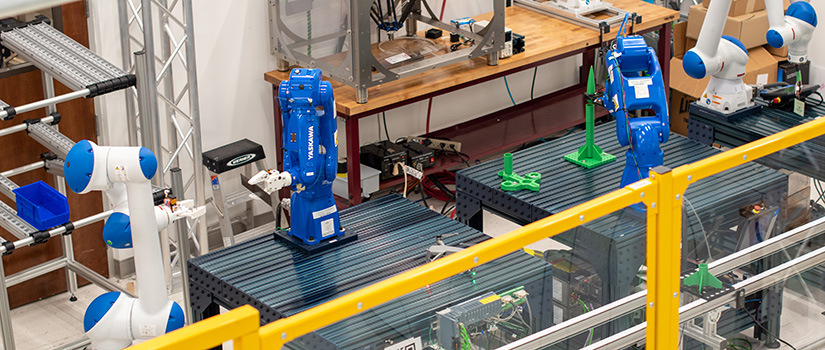Why Study Industrial Engineering?
Industrial engineers design and improve complex systems that integrate people, machines, materials, information, and energy. Their goal? To make things run smoothly, safely, and affordably across a wide range of industries. Industrial engineering is a good fit for individuals with strong analytical and problem-solving skills, who find satisfaction in maximizing efficiency and eliminating waste in systems, and who are creative thinkers and innovators. These include high school students who excel in STEM subjects, military veterans with honed analytical and problem-solving skills, and adult learners with practical experiences in technical roles. If you have a passion for making things work better, then industrial engineering could be right for you.
Industrial engineers have a bright job outlook! According to the Bureau of Labor Statistics, employment of industrial engineers is projected to grow 12 percent from 2022 to 2032, much faster than average.
Industrial engineers have a wide range of employment opportunities due to their focus on efficiency and system optimization. Common industries where they work include:
- Manufacturing: This is the traditional home for industrial engineers, where they design and improve production lines, optimize factory layouts, and ensure efficient use of machinery and materials.
- Healthcare: Hospitals, clinics, and other healthcare facilities employ industrial engineers to streamline patient flow, improve waiting times, and optimize resource allocation.
- Transportation: Logistics companies, airlines, and other transportation hubs use industrial engineers to design efficient transportation networks, optimize delivery routes, and improve overall logistics.
- Business Administration and Government Agencies: These organizations hire industrial engineers to improve internal processes, reduce operational costs, and optimize resource management.
- Consulting Firms: Many industrial engineers work as consultants, offering their expertise to companies across various industries on a project basis.
This list is not exhaustive. Industrial engineers can find opportunities in almost any industry that seeks to improve efficiency and productivity and:
- Analyze and improve processes by digging deep into how things are done, looking for bottlenecks and inefficiencies associated with human factors, technology, and time.
- Design new systems, workflows, or layouts to optimize efficiency and quality in facilities, organizations, management, or production.
- Communicate and collaborate with managers, staff, and other engineers to develop solutions and get everyone on board with implementing changes, explaining ideas to both technical and non-technical audiences.
- Collect and analyze data gathered through surveys, observations, and measurements, then use analytical skills to crunch the numbers and uncover trends and patterns.
- Ensure processes are safe and produce high-quality results, considering safety hazards and quality control measures when designing and implementing improvements.
With adaptability and focus on systems thinking, industrial engineers are valuable assets in a wide range of workplaces.
Curriculum
Our industrial engineering undergraduate curriculum combines engineering fundamentals, design, and management with computer modelling and real-world problem solving. The program’s development is supported by industrial engineering employers including Boeing, CMC, Michelin, Nephron, and Trane Industries.
Major subjects in the industrial engineering curriculum include:
- Introduction to Industrial Engineering
- Materials & Manufacturing
- Work Design & Ergonomics
- Production Engineering & Management
- Engineering Economics
- Operations Research in Engineering
- Quality Engineering
- Facilities Planning & Material Handling
- Smart Manufacturing
- Supply Chain Engineering
- Systems Simulation
- Industrial Engineering Laboratory
- Industrial Engineering Capstone Project
The curriculum also includes the Carolina Core, foundational math and science courses, and unrestricted electives. Independent study and special topics courses also provide unique learning opportunities.
Visit Undergraduate Curricula and Courses for additional details.
Electives
The industrial engineering undergraduate program includes up to 23 credit hours of unrestricted elective classes, which allows you to customize your degree. These classes can be tailored towards adding a minor to your program of study, or to developing advanced knowledge in another area of engineering and computing. In addition, transfer, dual enrollment, AP/IB and other college course credits may apply as electives.
Capstone Design
As a senior, you will work on real world problems with a team of other students in our industrial engineering capstone course. During your capstone project, you will improve your ability to manage complex engineering projects. With support from the project sponsor, you will identify problems, specify requirements, develop a prototype or finished solution, and validate your results. Written reports and oral presentations are integrated in a real-world environment.
Extracurriculars
Industrial engineering students can participate in a variety of clubs including our student chapters of:
- Society for the Advancement of Material and Process Engineering
- International Society for Pharmaceutical Engineering
- Society of Manufacturing Engineers
- Society of Hispanic Professional Engineers
- National Society of Black Engineers
- Society of Women Engineers
Undergraduate research opportunities for industrial engineering students are available. Undergraduate researchers get
involved on a volunteer, course credit, or paid position basis. Research areas include
advanced materials and manufacturing, transportation engineering, health information
technology, and more.
With other undergraduates in our college, industrial engineering students take full
advantage of living-learning communities, mentorship opportunities, study abroad, intramurals, internships, just hanging out with friends, and more.
Visit Student Experience to learn more.
